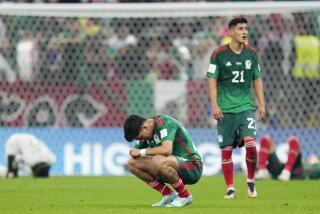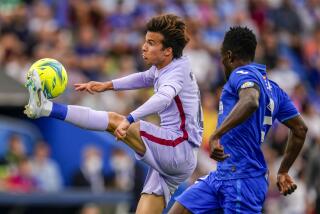Final run sets tone for future for U.S.
Soccer’s Confederations Cup is over and done with and the U.S. team, derided only 11 days ago but lauded today, is heading home from South Africa.
It does so not with its tail between its legs, as once feared, but with a silver medal around its neck.
So what did Coach Bob Bradley learn from a tournament that saw the Americans start off in horrendous fashion but still reach Sunday’s final, only to lose, 3-2, to Brazil in Johannesburg?
Quite a bit, as it turns out.
Bradley learned that goalkeeper Tim Howard is every bit the shot-stopper that predecessors Kasey Keller and Brad Friedel were. Ink him in as the starter at the 2010 World Cup. Ink Brad Guzan in as his backup. Guzan shut out Egypt and helped start the U.S. turnaround.
Bradley learned that Jonathan Spector can give Steve Cherundolo quite a run for his money as the starting right back, perhaps even knocking Frankie Hejduk back to third in the pecking order.
He learned that Jay DeMerit makes a very useful partner for Oguchi Onyewu in the center of the U.S. defense, and that moving Carlos Bocanegra from center to left back solves a pressing problem there, although Jonathan Bornstein is handy off the bench when more speed is required.
The Americans might have given up nine goals in their five tournament games, but the back line grew in confidence and ability as the Cup progressed.
“They work very hard and defend very determinedly,” veteran Brazilian midfielder Gilberto Silva said Sunday.
Bradley also learned that Benny Feilhaber and Ricardo Clark can work in tandem in central midfield, perhaps not as well as Clark and Bradley’s son, Michael, do, but effectively enough.
Add in the fact that German international Jermaine Jones wants to switch national teams and play for the U.S. and that Maurice Edu will be returning from injury and Bradley could have valuable depth in the defensive midfield.
He learned that using Landon Donovan and Clint Dempsey as wide midfielders is a positive option, especially if both players have the freedom to move inside at opportune moments and take a crack at goal.
Donovan’s play against Brazil on Sunday and in the semifinal victory over Spain, which finished third, was exceptional, as was his work rate.
Bradley learned that two forwards are better than one, and that Jozy Altidore and Charlie Davies could grow into a dangerous attacking pair, the former using strength and the latter using speed.
He learned that physically fit as the U.S. players undoubtedly are, they have yet to learn to sustain the level of intensity needed for the full 90 minutes and beyond.
The Brazilians can do that. As Donovan said in player comments posted on U.S. Soccer’s website, “eventually they just wore us down.”
Bradley learned that the U.S. still needs to do a better job managing a lead. Ahead by two goals, it should have been able to lock the door. Instead, it left it ajar.
“We gave them everything they could handle . . . and deserved every piece of that lead,” Howard said. But it lasted only 45 seconds into the second half and then evaporated altogether.
Bradley learned that leaving players on the bench will not necessarily bring the world crashing down on him. Out-of-form DaMarcus Beasley was banished after the first two games and was not missed. Once-vaunted Freddy Adu and highly rated Jose Torres did not see a minute of playing time but will probably do so in the Gold Cup that starts Friday. They were in South Africa to learn.
Of course, so was the entire team, coach included.
“You always hope to do the most learning when you win, but you probably learn more by losing,” Donovan said. “If we’re smart and we take what we should from this game, we can progress; and that’s what we’re trying to do.”
Bocanegra, the U.S. captain, echoed the sentiment.
“What we can take away from this is the confidence that we played so well against the big teams here,” he said. “We showed that we belong. We’re not just going to be a pushover in the World Cup when we come down here.”
--





